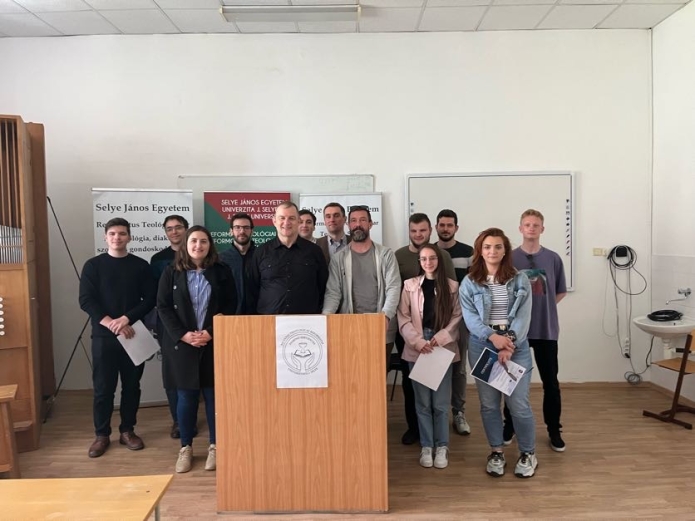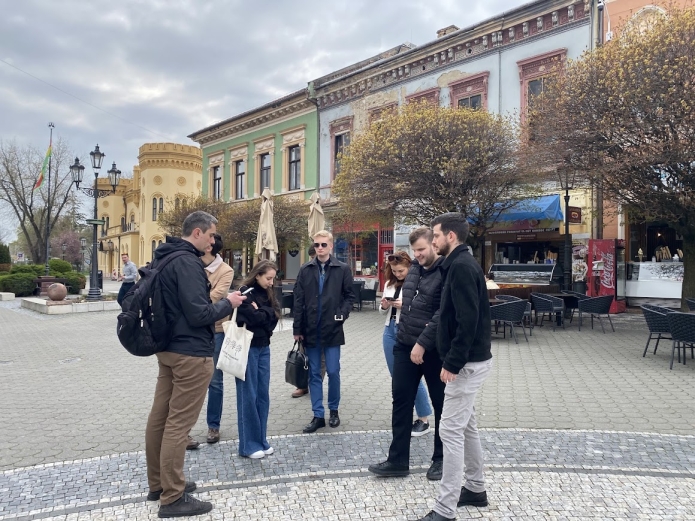Between March 31 and April 5, the first-year students of the Master’s program of the Protestant Theological Institute visited Komárno (Révkomárom) to participate in a seminar held at the local Reformed Theological Faculty.
In the Footsteps of Josephus Flavius and Albert Szenczi Molnár: First-Year Master's Students Visit Komárno Through Erasmus Mobility


Between March 31 and April 5, the first-year students of the Master’s program of the Protestant Theological Institute visited Komárno (Révkomárom) to participate in a seminar held at the local Reformed Theological Faculty. The seminar was led by Canadian historian and renowned Josephus scholar Steve Mason, and took place as part of an Erasmus+ Blended Intensive Program (BIP)—a mixed mobility project involving three institutions: Komárno, Debrecen, and Cluj-Napoca. The primary organizer was Dr. Viktor Kókai-Nagy, New Testament lecturer and founder of the Josephus Research Institute in Komárno.
During the seminar, Professor Mason introduced his research method, which is known for its meticulous, detailed examination of historical events and its cautious approach to generalizations. He emphasized constructing a broader understanding from many small insights, rather than jumping to quick conclusions. He presented compelling arguments challenging the widely accepted notion—endorsed even by modern scholars—that Romans and Jews harbored mutual hatred over many years and that Roman provocations inevitably led to rebellion, the fall of Jerusalem, and the destruction of the Temple. According to Mason, the real story is far more nuanced and complex. He explained that Josephus Flavius’ The Jewish War contains far more valuable historical data than is often assumed. However, he also argued that labeling the conflicts between Jews and Romans as “wars” is a significant exaggeration. His lecture was both engaging and accessible, and his personality—warm, gracious, and sympathetic—left a strong impression. Among the wealth of historical insights, perhaps the most important takeaway was the reminder that what are often treated as long-established truths may turn out to be misconceptions. Diligent inquiry and well-supported arguments remain crucial to reaching sound conclusions.
Alongside satisfying our intellectual curiosity, we also indulged in our cultural appetite. We spent more than a full day exploring the cities of Komárno, Bratislava, Senec, and Trnava. In Komárno, we even sat in the pew once used by the Jókai family at the Reformed church. Other highlights included the Bratislava Castle, the St. Martin’s Cathedral (the former coronation church), the Blue Church (Church of St. Elizabeth), the Cathedral of St. John the Baptist, and the Basilica of St. Nicholas. We also viewed the statue of Albert Szenczi Molnár and a museum exhibition dedicated to his legacy. On our final day, we visited an ancient Roman archaeological site at the former military camp and town of Brigetio, located near Komárno.
One evening, our hosts invited us to a group dinner at the Hubert hunting lodge restaurant, where we sampled a variety of delicious dishes and had the chance to meet and chat with fellow students from Debrecen. Of course, we couldn’t return home without tasting a few Slovak specialties like Bratislava rolls (pozsonyi kifli) and Kofola (a local soft drink). We also enjoyed dinner at Prestige Restaurant, which offered a beautiful view, and for fun, one evening we even visited a medieval-style peasant tavern.
For the shared travel, excursions, city tours, meals, and unforgettable moments, we owe heartfelt thanks to the organizers, Selye János University, Dr. Viktor Kókai-Nagy, our lecturer Professor Steve Mason, our accompanying professors Dr. Szabolcs Ferencz Kató and Éva Éles, and of course to the Erasmus+ Program.